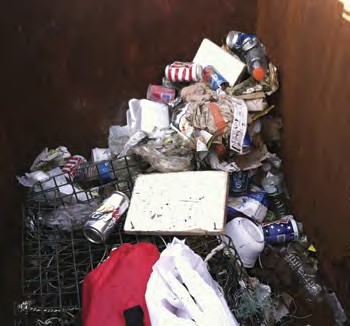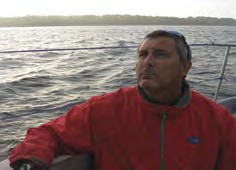By Joe Cooper
 Those of us who get to play on the water are remarkable lucky. We have experiences the land-bound do not. We all know what these experiences and moments are, for each of us. That’s the good news. The bad news is we also see the refuse that is improperly discarded and ultimately finds its way to the sea.
Those of us who get to play on the water are remarkable lucky. We have experiences the land-bound do not. We all know what these experiences and moments are, for each of us. That’s the good news. The bad news is we also see the refuse that is improperly discarded and ultimately finds its way to the sea.
One of the many reasons we carpetbaggers settle in Newport is it is a great place to be if you like being in, on and around water. Since we have such a passion for the water, it’s natural for us to get a bit grumpy when we see trash piled up anywhere, and particularly around the waterfront.
This is my collection after 30 minutes picking up trash at Sachuest Point National Wildlife Refuge in Middletown, RI. Clean Ocean Access and the Refuge joined forces on a program where the coastline of the Refuge is divided into sections and COA volunteers adopt each section. Once a month, on their own schedule each section “owner” does a clean up of “their” section. My section is only 300 yards along the Sakonnet River and this debris, taken from a 15-foot square, did not put a dent in the totality of rubbish I saw on the shoreline. © Joe Cooper
There are several groups in Newport that were founded by people with a desire to do something about this trash in the ocean problem. I am sure there are many more, but these are four I interact with in Newport, RI.
Green Drinks No, it’s not a St. Patrick’s Day cocktail. Green Drinks is a worldwide (679 cities) organization dedicated to getting like-minded souls together for a drink and some networking. There’s a chapter in Newport and they hold such gatherings once a month in the “off season.” There will be a speaker or two discussing what’s happening in their sliver of the battle on trash in the ocean in particular but in the bigger picture too. I attended a Green Drinks gathering last week and met three new folks, each dedicated in their lifestyle to being proactive in the trash-ocean-environment triangle. The Green Drinks group is like a clearinghouse for what’s up in the environmental field. greendrinks.org
Sailors for the Sea Newport-based Sailors for the Sea is working hard to educate sailors, focusing on ways for us to have a lower environmental impact, especially during regattas and races. Their principal program is the Clean Regattas Certification. This protocol offers four levels of environmentally sound procedures for running your event. The Clean Regattas program covers the gamut from individual races to dinghy regattas to the 34th America’s Cup, for which Sailors for the Sea was the Environmental Partner.
Sailors for the Sea has complete “Clean Regattas tool kit” that is literally a cut-and-paste playbook jammed with information on running a clean regatta. This manual covers things like: no single-use water bottles, water stations for refillable bottles, recycling bins at venues, minimizing or eliminating products and services that do not use healthy environment procedures, and so on.
Within this publication is a Clean Regattas Best Practices checklist that highlights 25 actions an organizing authority can undertake. Each action includes three tasks with check boxes, for a total of 75 actions your event can implement. Depending on how comprehensive your environmental planning is, your regatta can be certified Bronze, Silver, Gold or Platinum. The more actions you undertake, the higher your event’s certification. For bigger races like The Atlantic Cup presented by 11th Hour Racing, a Platinum level event, the Tool Kit lists tasks like having support boats and vehicles running on biodiesel and purchasing carbon credits. Sailors for the Sea also capture metrics on everything to do with the effort employed, yielding quantifiable statistics. sailorsforthesea.org
Clean Ocean Access This organization is focused on the actual removal of debris littering the Aquidneck Island coastline (CLEAN), making sure the local ocean water quality is good (OCEAN), and ensuring ACCESS to the foreshore on the island. Clean Ocean Access has established a fantastic calendar of events for their clean up days. cleanoceanaccess.org
On these days, volunteers assemble at a predetermined venue and time. Donated 55-gallon recyclable paper trash bags are handed out along with recording sheets, pencils and clipboards (for stats), gloves and donated coffee and hot chocolate. These clean ups target a specified area and usually run for two to three hours, and you can spend as little or as much time as you want removing debris from the coastline. All manner of people participate, and kids of all ages get a firsthand education in what not to do with that plastic cup.
The amount of debris collected is mind-boggling. Huge baulks of wood, tires, plastic detergent bottles, damages lobster traps and their plastic line, and of course coffee cups, fast food containers, cardboard boxes, beer cans and cartons, plastic shopping bags, cigarette butts (number one by item count) and similar detritus are collected, counted and segregated into appropriate bags for disposal. Clean Ocean Access also conducts water condition research in conjunction with various universities in Rhode Island. This has expanded recently into water quality review on the island’s water catchment areas and ponds.
Packaging2.0 This is a company that manufactures recyclable products from recycled products. As founder Michael Brown explained at last week’s Green Drinks meeting, think of two circles: One circle contains the natural environment we live in, and inside the other circle is the manufactured environment. Keeping these two circles from overlapping is the ideal condition. For instance, plastic shopping bags do not ever really break down in the ocean; they just break up into smaller and smaller particles. They then get into the digestive tracts of sea creatures and eventually kill them one way or another. This is, of course, if discarded nets, packaging or six-pack rings don’t get them first.
In pursuing a goal of keeping the circles apart, Packaging 2.0 manufactures a wide selection of food service containers from recycled materials that are themselves recyclable after use. The example Brown had at Green Drinks was a Styrofoam platter most supermarket meats come in, with the yucky sheet separating the meat from the Styrofoam. Neither of these two plastics can be recycled and so end up in a landfill or on the foreshore. Brown’s thesis is to do away with non-recyclable plastics and focus on keeping plastics in the plastic circle and not letting them out. packaging2.0.com
Every a long journey begins with the first step. Keeping our oceans free of rubbish is critically important on so many fronts. Take a look at these three non-profits and one business and see if you can take the first step.
 Australian born, Joe ‘Coop’ Cooper stayed in the US after the 1980 America’s Cup where he was the boat captain and sailed as Grinder/Sewer-man on Australia. His whole career has focused on sailing, especially the short-handed aspects of it. He lives in Middletown, RI where he coaches, consults and writes on his blog, joecoopersailing.com, when not paying attention to his wife, teenage son, dog, two cats and several, mainly small, boats.
Australian born, Joe ‘Coop’ Cooper stayed in the US after the 1980 America’s Cup where he was the boat captain and sailed as Grinder/Sewer-man on Australia. His whole career has focused on sailing, especially the short-handed aspects of it. He lives in Middletown, RI where he coaches, consults and writes on his blog, joecoopersailing.com, when not paying attention to his wife, teenage son, dog, two cats and several, mainly small, boats.




